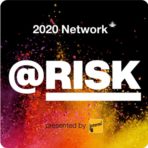
Welcome to @Risk. Truth be told, you have always been living at risk found at the intersection of magnitude and probability but you’re probably just much more aware of it now.
I want to thank you for listening to the special COVID-19 series podcast that I had the pleasure of producing on the 2020 Network, starting at the outset of the pandemic (C19cast). And I truly mean thank you and to all of my guests as the podcast helped me make sense of what was so rapidly unfolding around us, in terms of our evolving understanding of the virus; our clinical response to preparing for it and managing it; the economic consequences; and the human costs.
The pandemic is not over, likely far from it, and so of course its impacts continue to be felt in our homes, our learning and work environments, around the world. So as I set to resume podcasting in September, we could continue to discuss pandemic trajectory and effects and the Canadian road to recovery. And we will but COVID-19 won’t be the lens through which we examine important issues of the day this time — that nasty bug may still make me physically distance from my friends but it’s had enough air time. During the C19cast, we on multiple occasions also adopted a public health approach to discuss topics like firearm regulation, health equity and anti-Black racism. And that is an important and useful way to think about how we mount responses to challenging issues that threaten our health. While health is a fundamental condition in which we humans build and live our lives, I think there is another essential takeaway from this crisis that I would like to explore with you instead and that is: what other risks are we not thinking about, preparing for, and understanding better and how can we be build for resilience for the unknown unknown or for a low-probability big-impact event?
In my conversation with New York Times best-selling author of books about psychology and decision-making, Dan Gardner, about thinking during a pandemic in the C19cast series, he was pretty unequivocal: humans don’t think about risk well. It relates back to our psychology. We tend to crowdsource our risk assessments, overly guided by other people’s choices being the social creatures that we are. We often discount the likelihood of a risk event even as its probability rises; the probability of a certain event only grows as more time passes and yet we think less and less about the eventuality. We don’t typically use science, statistics and logic; we tend to favour our emotions and experiences. All of this means, we will probably over prepare for a pandemic now due to recency bias, just as we did for terrorist attacks after 9–11 as discussed on the C19cast with Ben Rhodes, New York Times best-selling author and former advisor to President Barack Obama.
COVID-19 has taken so much from us — human lives, businesses, large in-person gatherings, huge swaths of prosperity and equity — but we have not lost all of our progress, our economy marches on and we continue to enjoy life, liberty and security of the person (some more than others). An important lesson of COVID-19 is that we must do more to protect what we have during these dynamic and challenging times. Do you really value something if you’re not thinking about how you could lose it? Please join me @Risk, a new show on the 2020 Network, brought to you by Interac, and let’s think about risk better together.
Subscribe: http://ow.ly/1aZM50BtPXS
Jodi Butts, host of @Risk
